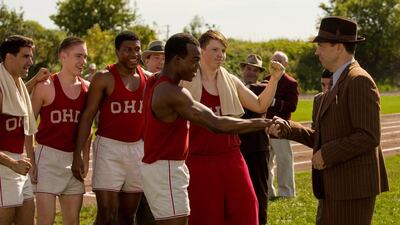Race
Director: Stephen Hopkins
Starring: Stephan James, Jason Sudeikis, Jeremy Irons
Four stars
Most people have heard of Jesse Owens, the Olympic gold medallist and record-breaking athlete – but it took more than physical strength to overcome the discrimination he faced as a young black athlete in the United States and overseas.
The biopic Race – made with the support and cooperation of Owens's family – has flaws. However, it succeeds in adding a new dimension to an American icon and perhaps – in a time of increased debate about racial diversity in Hollywood – reminds the industry of the richness of untold stories outside the white-male mainstream.
Ambitious in scope, the film tracks Owens’s rise from college student to Olympic hero, while also telling the story of the US Olympic Committee’s deliberations over participating in the 1936 games in Nazi Germany.
There is so much going on that the script, by Joe Shrapnel and Anna Waterhouse, feels like a Cliff’s Notes look at a significant period in history.
It follows Owens’s relationships with his wife, his coach and his main competitors. It shows the strife within the American Olympic committee and hints at unscrupulous negotiations with Nazi officials. There is even a subplot about filmmaker Leni Riefenstahl (Carice van Houten), who famously documented the Games for Hitler’s Nazi regime, which expected the competition to support its theories of a superior Aryan race.
At the centre of the story, though, are Owens (Stephan James, subtly introducing himself as a capable leading man) and his coach, Larry Snyder (Jason Sudeikis, in a convincing dramatic turn). When they meet in 1933, Snyder spots the young athlete’s potential and insists he start training for the 1936 Games.
Meanwhile, a powerful member of the US Olympic Committee, Avery Brundage (the always excellent Jeremy Irons), is facing off with the group’s president Jeremiah Mahoney (an underused William Hurt) over whether US athletes should go the Olympics. Mahoney wants to boycott the Olympics in protest against the Nazi persecution of Jews but Brundage believes politics should be kept out of sport.
Owens, meanwhile, is thriving as an athlete but struggling to support and commit to wife-to-be Ruth (newcomer Shanice Banton, who is outstanding), and their baby daughter.
The already overstuffed script unnecessarily introduces a potential romantic rival. It’s unclear whether any such rival even existed – the filmmakers acknowledge playing loose with some of the facts. And though interesting, the subplot about Riefenstahl feels extraneous.
Owens's story alone is more than enough to fill the film. Race only touches on his friendship with German athlete Carl "Luz" Long (David Kross). Intended by the Nazis to be the symbol of Aryan perfection, he resists this role and befriends Owens. The men linked arms in the Olympic arena and remained friends for life.
Directed by Stephen Hopkins, Race suffers at times from an overly earnest tone. Though James and Sudeikis share some poignant moments, they also have some painfully corny exchanges.
Yet for all its flaws, Race is an enjoyable, worthy, inspirational film. Most valuable, though, is its reminder that the type of hate personified by the Nazis – the same racist hate that forced Owens to use the service entrance to attend a dinner in his honour – remains a deadly scourge that would erase future champions.
• Race is in cinemas now
* AP

